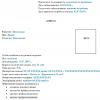How retinoids work on the skin. Retinoids: what it is, who is it for and how to use it. Types of retinoid drugs
Retinoids are preparations containing ingredients that have the activity of vitamin A. Natural sources of this vitamin can be: eggs, dairy products, liver. There is also a lot of it in carrots, tomatoes, apricots, chicory roots, rose hips. But there is no plant retinol a priori. It can be either a synthesized substance or of animal origin. Plants also contain vitamin carotene, which is provitamin A.
Retinols are involved in metabolic processes, normalize the structure of the epidermis. Maintains normal skin condition by rejuvenating dermal cells. Synthesized preparations containing retinol are now widely used in dermatology. Their doctors recommend to get rid of acne, pigmentation (freckles and age). And also to rejuvenate the skin and reduce wrinkles. Retinoids can have anti-inflammatory, anti-comedogenic, and keratomodelling effects.
But it is worth remembering that the uncontrolled use of such drugs can lead to skin irritation. In this article, we will consider in which cases it is advisable to use a particular drug in order to avoid local skin irritation and at the same time achieve the desired results.
Principle of action on the skin
Thanks to the effect of retinoids on the skin, you can get rid of many problems, because:
- They act as a natural exfoliant, removing dead cells from the epidermis and unclogging clogged pores, after which cell renewal begins. Small scars, wrinkles, pimples are eliminated during the action of the substance. You can choose a cream for scars and scars at. In addition, clogged follicles can lead to keratosis. And the use of retinoids successfully solves this problem;
- Under the influence of retinol, the collagen formed smoothes fine wrinkles and removes age spots;
- Retinaldehyde, which is a cosmetic retinoid, works well on acne and the skin regains its even structure and dullness.
Classification
There are three generations of retinoids that are used to combat skin breakouts, acne, wrinkles, and pigmentation. The features of these groups will be discussed below.
First generation
This group includes the most effective anti-acne drugs: Retinol, and Tretinoin (vitamin A as carboxylic acid), Isotretinoin (Roaccutane, Acnecutan)... Tretinoin was the first topical retinoid to be used against acne, but the substance breaks down very quickly when exposed to sunlight. You can pick up an acne cream. Also, in some cases, it can irritate the skin. Usually applied in local therapy in the form of ointments or gel.
Second generation
Second generation represent Etretinate and its derivative Acitretin... These are synthetic derivatives of Retinoic acid. The drugs are close to Retinol, but they are not part of the ointments or gel. They are taken orally in the form of tablets, capsules. Effective for psoriasis, lupus erythematosus, ichthyosis.
Third generation
After further structural changes of the first generation drugs, carotenoids were obtained by chemists (Tazaroten, Bexaroten)... They do not contain retinoic acid, but they retain the activity of retinoids. It is more used to treat cancer, such as cutaneous lymphoma. 
Features of the use of retinoids
Retinoids are used in combination with antibiotics for acne moderate... You can find out how acne is treated in adolescents. That is, if several acne appears on the face, you should not resort to remedies this group, especially tablets and capsules. They have many side effects, among which the strongest blow to the liver.
Ointments and gel dry out the skin, it begins to peel off. Therefore, it is contraindicated for people with dry skin to use external agents.
According to the method of application, retinoids are divided into systemic (tablets, capsules) and topical, that is, local. This group includes creams and gels.
Administration of topical (topical) retinoids
Local retinoid therapy is safer than systemic therapy. Prescribe drugs of this group for the treatment of rosacea, acne, with photoaging of the skin. For diseases, retinoids are combined with antibiotics to relieve inflammation.
Topical retinoids are classified into 2 types:
Natural
Retinol, retinaldehyde and others enter the body together with food. There they rearrange their molecular chain into isomers of retinoic acid or retinol, which inherit the characteristics of vitamin A. And due to this, they effectively affect the skin, triggering various biological reactions. And this has a positive effect on the condition of the skin. In the annotations to cosmetics, you can often see that the composition of the preparations contains retinoids of natural origin, such as: tretinoin, retinyl palmitate, retinaldehydum.
They are included in such preparations:
- Retinoic ointment;
- Retasol;
- Isotrexin.
Synthetic
Synthetic retinoids are artificially created. And although in their action they do not differ from their natural counterparts, the chemical formula is completely different.
The main difference is that synthetic substances are able to activate only some receptors in the skin. This selectivity allows you to reduce the aggressiveness of exposure to the skin, as well as significantly reduce the likelihood of allergic reactions.
At the moment, synthetic retinols such as:
- Adapalen;
- Differin;
- Locatsid.
If the skin is sensitive, then doctors try to prescribe synthetic drugs, but for oily skin for those prone to rashes, drugs that contain natural retinoids are better suited.
Prescribing systemic (oral) retinoids
If there is no improvement in the condition of the skin after treatment with local drugs of this group, then systemic ones are prescribed. This usually happens when skin diseases cover a large area. If monotherapy with retinoids is carried out, then positive changes can be observed after 2-3 months. Systemic drugs include:
- Roaccutane;
- Will erase;
- Aknekuttan;
- Verocutane.
Indications for use
When no other drugs help, then dermatologists prescribe retinoids in such cases:
- Acne, pimples. Moderate or severe form;
- Prevention of skin photoaging;
- Scaly lichen (psoriasis) treatment;
- Blockage sebaceous glands and the formation of abscesses;
- Alzheimer's disease;
- Oncological diseases of the skin.
Acne retioids
Acne, due to various subjective and objective reasons, can appear not only in adolescents, but also in quite old people. If the lesion of the skin is moderate or severe, then Retinol will help get rid of the pathology, which has a milder effect on the lesions than Retinoic acid. Penetrating into the skin, it restores protein elastin, affects the production of its own collagen. Unclogs pores, relieves inflammation and regulates sebum production by the glands. , which contain Retinol.
Among the most proven drugs:
- Tretinoin;
- Locatsid;
- Retin-A.

Retinoids for wrinkles
After regular use, retinoids reduce fine wrinkles by affecting the skin's own collagen production. You can find out which is the most effective collagen cream by. Thereby increasing its elasticity. In addition, by affecting the production of melanin, they prevent the appearance of various age spots and bleach those that have already appeared.
Among effective drugs the most popular among women are:
- Tretinoin;
- Retinalgide.
Tretinoin is more effective in preventing the breakdown of collagen in the dermis, and retinaldehyde has a softer effect on the skin.
Retinoids for psoriasis
Psoriasis is a chronic, recurring skin disorder in which the dermis produces an excess of cells, causing the formation of plaques covered with grayish-white scales that easily flake off the skin. Therefore, the task of treating pathology is to stop the growth of cells. This is exactly what retinoids can do, which significantly reduce the rate of division, and at the same time relieve inflammation of the skin in the affected area.

Psoriasis treatment
The most effective drug against psoriasis is Tarazoten.
In some cases, the use of the drug leads to dryness of the skin, which is highly undesirable in this disease.
Retinoids for warts
Neoplasms in the form of warts are easily removed by various special creams, but when this cannot be done, dermatologists prescribe retinoids. External agents regulate keratinization, disrupt the growth of wart cells, and prevent their reappearance. If you started using drugs against warts, then you need to exclude exposure to direct sunlight, and cover the treated areas from their effects. Not all drugs can cope with flat warts. One of the most effective is considered to be Tazorak.
Retinoids against aging
Using the drug with retinoids, after a short period of time, you can see the results. The skin is leveled, it becomes soft, smooth, bright. Retinol products can be purchased without a prescription, but it will take longer to see the expected results. If the composition of the drug indicates the presence of 0.1% and using it for several months the result is not visible, then it is necessary to look for a remedy with more high concentration of this item.
- Renova;
- Avage;

Price: 800-900 rubles.
Retinoids for acne
Dermatologists carry out monotherapy for acne manifestations, but most often in a complex manner, using retinoids and antibacterial drugs... These are usually ointments and gels. And this is preferable to systemic drugs with more pronounced side effects... You can choose a gel for acne on the face at.
The results of using products with retinoids:
- Decrease in sebum produced by cells;
- Normalization of the state of the follicles;
- Suppression of inflammatory processes;
- Alignment of the skin;
The drugs are used to treat moderate acne.
Such drugs have proven their effectiveness against pathology as:
- Roaccutane;
- Retinoic ointment.

Price: 450 rubles.
Contraindications to the use of retinoids (use during pregnancy)
It seems that drugs with the properties of vitamin A do not harm the body. But they have a number of serious contraindications:
- Diseases of the kidneys, liver;
- Sensitivity of the skin;
- Pregnancy and lactation. The use of retinols during this period is categorically unacceptable, since they not only cause various defects in the fetus, but also negatively affect the growth and development of an already born baby.
You cannot independently prescribe drugs of this group to yourself, both locally and systemically. Be sure to contact a dermatologist for advice.
Side effects
Retinoid drugs are quite effective against some skin diseases and aging. But at the same time, they can cause side effects. Such as the:
- Dryness and peeling of the skin, swelling, blistering with external use of drugs;
- Hypersensitivity to direct sunlight;
- Shortness of breath, a slight increase in temperature;
- Hypertension;
- Itching and burning of the skin;
- Gastrointestinal tract. Vomiting, diarrhea;
- Central nervous and the cardiovascular system... Dizziness, arrhythmia, chest pain, weakness.

Retinoic dermatitis is one of the side effects of retinoid use.
How to improve the effectiveness of retinoids
To get the desired result, it is necessary not to forget about such simple rules during the period of using drugs with retinoids:
- Before applying ointments, you need to clean the skin very thoroughly;
- Do not stay in direct sunlight;
- You need to balance your diet. Give up sweet, fatty, spicy, starchy foods. V daily menu you must include vegetables, fruits, fish, meat, yolk chicken eggs, liver. And also nuts, carrots, sprouted grains, spinach, red pepper, apricots. The daily human need for carotene is 5 mg per day, vitamin A from 1 to 2.5 mg.
- Expose to air as often as possible. Preferably in the green area of the city.
- Avoid stressful situations
During the treatment period, it is imperative to use special gels for washing your face against inflammation and acne.
Video
Conclusion
Retinoids - chemical elements which are effective against skin diseases such as psoriasis, acne. They resist the appearance of wrinkles and eliminate the already formed ones. They successfully fight against warts and phyto-aging. But before starting treatment with retinoids, you must:
- Plan the course in advance, and it will take at least 3 months. The use of drugs should be regular.
- It is better not to start treatment in the summer. Retinoids dry out the skin, and the sun's rays can burn it.
- A pea cream is enough to treat the affected area. If after a few minutes the skin remains sticky, then the amount of the product needs to be reduced.
- Cosmetics for make-up should not contain alcohol.
- Be sure to use sunscreen before going outside in summer.
- it is better to use not in the morning, but in the evening.
- You can not independently prescribe such funds to yourself. It is strictly forbidden to use them during pregnancy and lactation.
Cream with retinoids, ointments with retinoids, what kind of drugs they are and what they are used for.
Cleansing creams with alpha hydroxy acids or salicylic acids better than granular because of their unnecessary roughness. When using retinoids, avoid sensitive areas such as lips and upper eyelids... If the feeling is too sticky, then you have used too much retinoids. Remove excess preparation from the skin immediately with a clean cloth. Next time, use only half of that dose.
Avoid skin irritation
The various creams and ointments you use on a daily basis can react with retinoids. For example, those based on alcohol are also exfoliating scrubs, astringents, makeup, and medicated cleansers. Therefore, be careful when using these products along with retinoids. Watch for skin irritation, if irritation occurs - identify the source and avoid using this product.
Understand the importance of sunscreen
If you are lucky and live in a sunny region 😊 then put on sunscreen every morning when you go outside wide range with an SPF of at least 15 or higher. Retinoids remove the skin's natural defenses against UV rays by exfoliating dead skin cells, so be vigilant and remember to use sunscreen.
Use retinoid medications at night
Sunlight can reduce the effectiveness of retinoids, so it is best to use retinoids at night. Moist skin increases the sensitivity of your skin. Therefore, cleanse your skin 20 minutes before using the product to keep dryness, redness and flaking to a minimum. Use a night moisturizer after applying retinoids. If your skin is too sensitive, use a moisturizer before applying retinoids. And don't worry, it won't jeopardize the results of the procedure.
Short contact method
If after applying the product with retinoids, you feel a burning sensation, then wash off the product 15 minutes after application. Experts call this the short contact method. This action will allow you to get most of the benefits of retinoids, with only a slight decrease in its performance.
Do not hurry
Experts suggest using retinol every three days for at least the first two weeks. You can then use retinoids every other day for the next two weeks and gradually work your way up to daily use. For people with fair skin tone and light eyes, the process may take a little longer, while for some people it may be sufficient to use retinoids every other day. You must follow the regimen you choose to get the most out of these products.
- RoC Retinol Correxion Sensitive Eye Cream
- Neutrogena Rapid Wrinkle Repair Serum
- Philosophy Help Me Retinol Night Treatment
- Peter Thomas Roth Retinol Fusion Alternative
- StriVectin-AR Advanced Retinol Day Treatment SPF 30
- SkinCeuticals Retinol 0.5
- La Roche-Posay Redermic R Eyes
- Vichy LiftActiv Retinol HA Concentrate
CONCLUSIONS
Attention should be paid to retinol, your skin surface is affected by signs of aging, wrinkles, uneven skin color and apparent loss of firmness. Research shows that retinol naturally supports healthy state skin, and this makes it one of the most attractive skin care ingredients in use today. If you decide to undergo retinoid procedures, be sure to take necessary measures precautions and consider possible side effects. If you are pregnant or planning to become pregnant soon, it is in your best interest to avoid the use of retinoids because it can cause abnormalities in your unborn baby.
In modern cosmetology, there are many medicines, the action of which is aimed at eliminating age-related changes in the skin. Retinoids should be distinguished into a separate group - drugs that have not only a rejuvenating effect, but also actively fight acne.
What it is?
The term "retinoids" means all preparations based on vitamin A. They have a number of positive properties:
- Promote the rejection of dead cells of the epidermis.
- Reduce the secretory function of the sebaceous glands.
- Increases the production of collagen, elastin and hyaluronic acid.
- Leaves skin firm, maintains its tone and texture.
- They normalize the regeneration process.
- Helps get rid of age spots and wrinkles.
To achieve and maintain the maximum effect of therapy, experts recommend using retinoids for life, while observing the basic rules of use.
Despite the fact that women of different ages can use these drugs, the main action of the funds in this group is to eliminate age-related changes in the skin.
Retinoid acne treatment
As you know, vitamin A, which is presented in retinoids various forms, influences the growth process, differentiation and functioning of epithelial cells. Retinoic acid interacts with the gamma and beta receptors of the cell, as a result of which its nucleus synthesizes specific substances, which have the desired clinical effects.
The first 3 weeks after starting the use of retinoids, the skin begins to redden and peel off profusely. This is an indicator of the activity of the process that "starts" the death of old cells of the epidermis. As a result, the upper stratum corneum is thinned, the skin acquires a fresh and youthful appearance.
Retinoids reduce acne on the skin due to their ability to unclog pores that are clogged with oil plugs. At the same time, not only secretion is normalized, but also the composition of sebum, the size of the sebaceous glands is reduced, and the inflammatory process around them is eliminated.
Thanks to the effects of retinoids, a pronounced anti-aging effect is noted. This is due to an increase in collagen production, by activating fibroblasts, as well as by stimulating the synthesis of hyaluronic acid along with an acceleration of the division of stem keratinocytes.
Types of retinoid drugs
There are several main forms of vitamin A, among which they are of natural origin:
- Retinol esters. Produced under the names Retinol Acetate and Retinol Palmitate.
- Pure retinol. The drug of the same name exists in several forms - pills, tablets, capsules and in the form of an oil solution. It is used mainly inside, as well as intramuscularly.
- Retinaldehyde. Contained in many cosmetic preparations for external use (cream, serum).
- Isotretinoin. Frequently found drugs with this form have the following names - Retinoic ointment, Roaccutane.
- Trans-retinoic acid.
These forms are from the first generation of retinoids and are listed in order of increasing effectiveness. In addition, there are also synthetic analogues - Tazaratenic acid (third generation) and Adapalen (a completely different group with the properties of vitamin A).
Local
Retinoids for external use come in the form of an ointment, gel or cream. They are used mainly for face care with age-related skin changes and mild to moderate acne.
Retinoid face creams

The largest group of retinoids is included in the composition of products intended for external use.
The most popular are:
- Isotrexin cream. The drug, in addition to isotretinoin, also contains erythromycin. In structure, it is a homogeneous, soft mass of pale yellow color. A minimum amount of the active ingredient is absorbed through the skin. Despite this, the drug is not recommended for use by pregnant and lactating women, as well as for patients with malignant tumors on the skin.
- Avita cream. The active ingredient is trans-retinoic acid. Depending on concentration active ingredient, there are Avita cream 0.025 and 0.03%.
- Retin-A cream. Has the same active ingredient as Avita. Both drugs are used with success in the fight against deep wrinkles. This is due to the fact that trans-retinoic acid prevents collagen breakdown better than other forms of vitamin A. Since the active ingredient often causes side effects, the drug can only be purchased with a prescription from the attending physician.
- Renova cream. Another drug based on trans retinoic acid. Due to its low cost and pronounced efficiency, it occupies a leading place in its group.
- Differin cream. The active substance is adapalene. The drug exists both in the form of a cream and a gel. Preference is given to one form or another depending on the type of skin. For dry and sensitive skin, Differin cream is recommended, and for normal or oily skin, a gel. The drug is approved for use in children, but only over the age of 7 years.
Products based on trans-retinoic acid are most effective, but often irritate the skin. That is why it is forbidden to combine them with drugs that contain benzoyl peroxide. This rule does not apply to adapalene-based products, and therefore they are given an advantage in treatment mixed form acne disease.
Healing ointments

The most popular and budgetary local preparations of this form include Retinoic ointment. Her active ingredient isotretinoin. On the pharmaceutical market, it is found in two concentrations - 0.05% and 0.1%. The ointment is odorless, has a yellowish tint. Possesses fast absorption capacity. It is absolutely safe, because it is free of side effects, which has been proven by many studies.
The list of retinoid ointments is not as extensive as other forms. of this drug... Retinoids in the form of a gel are similar in structure to them. Available on the market synthetic drug based on adapalene - Klenzit. It is a white gel, uniform in consistency, with an active substance content of 0.1%. The first 3 weeks of therapy, skin rashes may worsen, which should not be a reason for discontinuing the drug.
Peelings
The procedure is carried out in beauty parlors. Its essence consists in applying a mask with 5% retinol or 5-10% tretinoin to the surface of the skin of the face. Unlike other types of peels, this procedure is not accompanied by tissue damage, since the horny scales exfoliate on their own.
After the procedure, in some cases, irritation and dryness of the skin may occur, which disappear over time.
The result lasts for the next 4 months. The effectiveness of retinoic peeling is comparable to that of a fruit peel.
Systemic

Retinoids in tablets and oral solutions are prescribed when the rash is spread over a large area of the skin or there is no reaction to the topical drugs used.
Tablets
In pills, retinoids are only prescribed for severe acne. The most commonly used drugs are isotretinoin (Roaccutane, Acnecutan).
Isotretinoin is a substance that is highly active even against old rashes. It is forbidden to take preparations containing it on your own. Only the attending physician can select the required dosage, taking into account clinical picture, the results of laboratory tests and chronic diseases sick.
On average, the course of treatment lasts 12-16 weeks. The effect of the drug persists for several months after the end of its administration.
During the therapy, the doctor must monitor the biochemical parameters of the blood.
Contraindications
Local retinoids are practically safe drugs, which is associated with low concentrations of the active ingredient and its low absorption. Despite the fact that their teratogenicity has not been proven, the use of external forms of retinoids for pregnant and breastfeeding women is not recommended.
- Dermatitis.
- Impaired liver and kidney function.
Pregnancy and lactation are an absolute contraindication to the appointment of oral forms of the drug, which is associated with their teratogenicity. In addition, women should avoid pregnancy for a year after the end of therapy with systemic retinoids.
V complex therapy for mild to moderate acne, local acne retinoids are used - drugs that do not cause such strong side effects as systemic. They require long and regular use, but with the help of them you can achieve a good result.
Local retinoids for acne have the following therapeutic effect on the skin:
- normalize sebum production;
- contribute to the narrowing of the sebaceous ducts;
- reduce inflammation;
- increase local protective functions.
Retinoids have a curative effect on acne due to their main component - retinol.
Topical retinoids: drug names
Local retinoids are classified as natural or synthetic. The first group includes isotretinoin, the second - adapalene.
The following external acne products are produced on the basis of isotretinoin:
- Retinoic ointment;
- Retasol;
- Isotrexin.
Adapalene is part of such retinoid preparations as Klenzit, Adapalen and Differin.
Application of Retinoic Ointment
The drug is used for external use in the treatment of seborrhea and rosacea.
The ointment is applied twice a day to the inflamed areas of the skin of the face and other areas of the body affected by acne. The course of treatment varies from 1 to 1.5 months, depending on the severity of the acne.
Among the side effects are allergic reaction, increased dryness and irritation of the skin.
During pregnancy and lactation, external use is contraindicated.
The average cost of a retinoid drug for acne is 250 rubles.
Retasol treatment
Retinoids for acne topical application are produced not only in the form of gels and ointments, but also in the form of a solution. These drugs include Retasol. It helps to reduce inflammatory process, accelerates the process of cell regeneration and significantly reduces the production of sebum. 
The solution is applied twice a day to clean and dry skin. The duration of use is 4-6 weeks.
In the presence of pathologies of the kidneys, liver and chronic intoxication, the use of the solution should take place under the supervision of a physician.
During the period of therapy with Retasol and any other retinoid drug, the patient should avoid exposure to direct sunlight.
The price of the drug is within 400 rubles.
Features of the use of Isotrexin
The gel belongs to the combined type of drugs, since in addition to isotretinoin, it contains the antibiotic erythromycin, which increases the therapeutic effect of the local drug. The second active ingredient can significantly reduce the population of pathogenic bacteria in the dermis. 
To get good therapeutic effect Isotrexin is used twice a day every day. A visible therapeutic result is noticeable after 1-1.5 months of regular use.
If itching, burning, tingling occurs, therapy is interrupted for several days, after which it is resumed again. If side effects occur again, it is recommended to refuse to use the product.
The cost of the gel today averages 400 rubles.
How to use Klenzit for acne
The most effective topical acne retinoids are based on adapalene. These drugs include Klenzit. 
It is enough to apply an external agent once a day to achieve a therapeutic effect. The first results from the use are noticeable after 1-2 months of treatment. Complete cleansing of the skin, as a rule, occurs after three months of regular use.
The average cost of Klenzit in pharmacies is 450 rubles.
Adapalen against acne
The drug of the group of topical retinoids has the same name as its main active ingredient. It has the same principle of action as the medication described above. Available in gel form. 
In the treatment of acne, adapalene-based acne retinoids can be combined with clindamycin and benzoyl peroxide to increase therapeutic efficacy. However, it should be noted that they must be used at different times of the day. The affected integuments should be treated with benzoyl peroxide or Clindamycin in the morning, and Adapalene in the evening.
Differin's use for acne
Means local action produced in two dosage forms- in the form of a cream and gel, which have the same concentration of the main active ingredient, adapalene.
With the course use of Differin in the skin, the process of keratinization and epidermal differentiation at the cellular level is normalized. 
Differin, like other topical retinoids, should not be combined with systemic retinoid preparations in order to avoid overdose.
How to improve the effectiveness of retinoids
During the acne treatment period, it is very important to provide proper and regular skin care. Medicines for acne are used to increase the effectiveness of topical retinoids.
An important role is played by and. From the diet suffering from acne, it is recommended to completely exclude or minimize the use of fatty, sweet, fried and smoked foods, that is, those foods that contain a large amount of carcinogens. Food must be included in the daily menu. vegetable origin... All types of fresh vegetables, fruits and berries are very useful for the skin. Fish, meat, nuts, whole grains and dairy products are also essential for healthy skin.
Systemic retinoids for acne
In severe forms of acne, which include the use of local retinoids for the face, it is ineffective. In these cases, systemic drugs are prescribed, which include Sortret and Verocutane. The main active ingredient of these medicines isotretinoin acts.
The dosage of systemic retinoids is selected based on individual characteristics: age, body weight, severity of acne.
Oral preparations based on isotretinoin have many side effects and contraindications, so they should be prescribed exclusively by a doctor and used under his supervision in order to avoid complications.
Retinoids are derivatives of retinol, that is, vitamin A, which, in turn, belongs to the group of fat-soluble substances. Synthetic retinoids are medicinal substances that are prohibited from being used in cosmetics. The beauty formulas most often include some precursor forms that are absolutely safe.
Retinol esters: retinol acetate, retinol palmitate.
Retinaldehyde.
Retinoic acid.
The concentration of retinol in homemade anti-aging creams is usually no more than 0.1%. In more serious medicinal preparations- from 0.4% to 1%.
Retinoid Creams: Effects on the Skin
Retinoids normalize the renewal process of the epidermis and slow down the work of the sebaceous glands, preventing the proliferation of P. acnes bacteria - acne provocateurs. Cosmetic products and medications with retinoids are considered one of the most effective against acne because they:
stabilize sebum secretion;
accelerate the exfoliation process;
lighten the acne marks.
Retinoids have proven to be effective as an anti-aging ingredient as well. By stimulating cell renewal, they reduce the area and number of wrinkles, and also trigger the synthesis of collagen and elastin, the production of which slows down with age.

Are cosmetics with retinoids dangerous?
When choosing a retinoid cream, pay attention to some of the nuances.
Unpleasant sensations
Side effects of retinoids include dryness, burning, and flaking. Do not be alarmed, this is a normal skin reaction to accelerate renewal processes. The hydrolipidic mantle of the skin is destroyed and needs to be repaired. Dense nourishing creams with oils will help in this case.
Increased photosensitivity
If you use makeup with retinoids, be sure to apply sunscreen before going outside. The rule applies not only to walking along the beach (in summer, by the way, it is better not to use such means), but also to moving around the city. And non-observance is fraught with the appearance of age spots.
Retinoids also have contraindications: skin hypersensitivity, pregnancy and breastfeeding, damaged lipid barrier or open wounds.
Cosmetics review
Night intensive lifting treatment Revitalift, L'Oréal Paris

The formula with proretinol and fibroelastil stimulates the synthesis of elastin fibers, increasing skin elasticity. Vitamin A is responsible for cellular renewal, thereby lightening pigmentation (both age-related and post-acne) and smoothes wrinkles.
Concentrated anti-aging treatment with retinol Redermic R, La Roche-Posay

The composition contains two forms of retinol at once, so the remedy works twice as effective. The fluid is recommended for aging skin: it stimulates the synthesis of building proteins, brightens pigmentation, corrects both expression and age-related deep wrinkles.



















